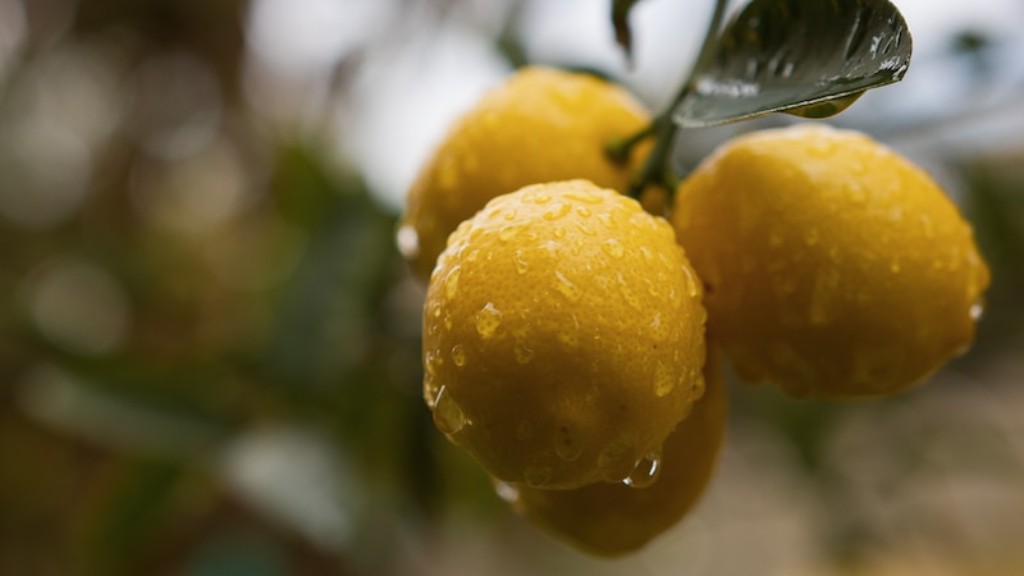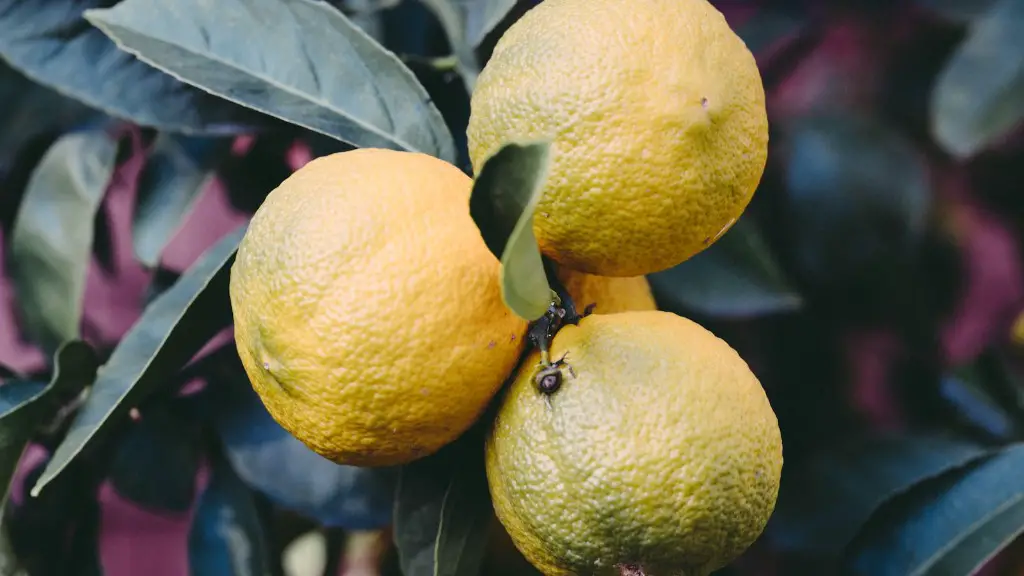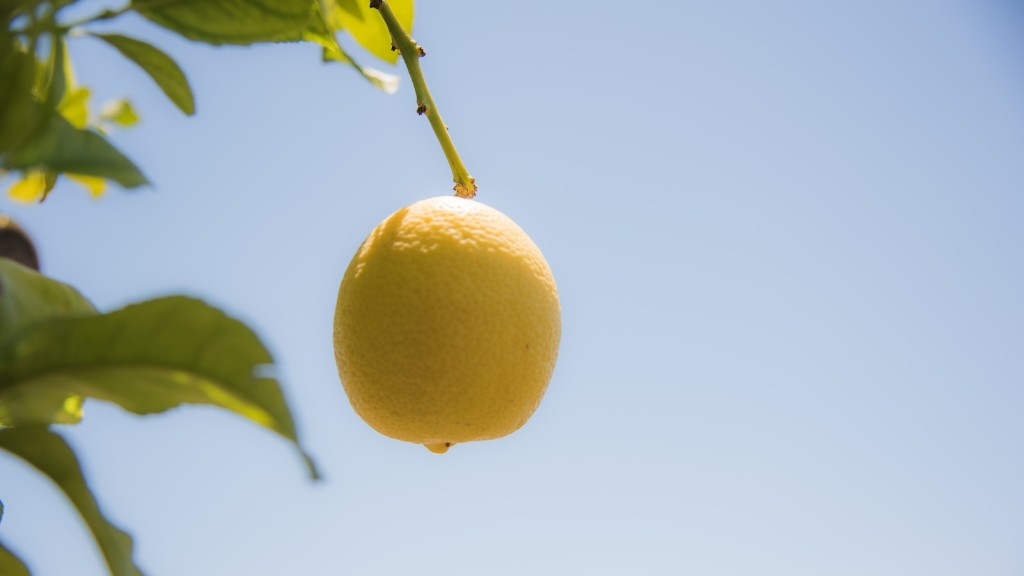Citrus trees are lovely houseplants that will brighten any room and purify the air. They are also quite easy to care for, as long as you give them the right conditions. Here are some tips on how to care for a lemon tree.
Lemons are one the most popular citrus fruits and are grown in many home gardens. Here are a few tips on how to care for your lemon tree:
1. Plant your lemon tree in an area that receives full sun for at least 8 hours per day.
2. Give your lemon tree well-drained, sandy soil that is rich in organic matter.
3. Water your lemon tree regularly, especially during the hot summer months. The soil should be kept moist but not soggy.
4. Fertilize your lemon tree every few months with a citrus fertilizer.
5. Prune your lemon tree regularly to encourage new growth and fruit production.
6. Protect your lemon tree from frost during the winter months.
7. Watch for pests and diseases such as aphids, scale, and citrus canker. Treat problems promptly with an appropriate pesticide or fungicide.
How do you care for a potted lemon tree?
So the trick to growing healthy plants is to just recreate nature. Water the plants really well, let them drain really well, and then let them dry out completely before watering again. This will help them to develop strong roots and stay healthy.
Lemon trees are susceptible to a number of problems, including citrus canker, sooty mold, botrytis blight, anthracnose, and lemon scab.
Citrus canker is a bacterial disease that causes lesions on the leaves of lemon trees. Sooty mold is a fungus that grows on the honeydew produced by aphids and other insects. Botrytis blight is a fungal disease that causes fuzzy gray mold and brown spots on the leaves of lemon trees. Anthracnose is a fungal disease that causes tan spots with dark outlines on the leaves of lemon trees. Lemon scab is a fungal disease that causes brown scabs on the leaves of lemon trees.
To prevent these problems, it is important to keep your lemon tree healthy and free of pests and diseases. Regular pruning and fertilization will help to keep your lemon tree healthy. If you do notice any problems, be sure to treat them promptly to prevent further damage.
How often do you water a lemon tree
Lemon trees need a consistent watering schedule to stay healthy and happy. Depending on the amount of rainfall in your area or the humidity indoors, a lemon tree should be watered once a week or bi-weekly. Checking the top 2 inches of soil is a good way to determine when your lemon tree needs to be watered.
It’s important to check your soil once a week to see if your Meyer Lemon Tree needs water. The tree needs water if the soil feels dry to the touch 2 inches below the surface. To water the tree, slowly pour water into the pot and count to 20. You can also wait until you see water running out of the bottom of the pot. Generally, Meyer Lemon Trees need water every one to two weeks.
Do lemon trees need big pots?
If the soil in a large container stays too wet, the young tree with a small root system may rot and die. A new citrus tree will grow fine in an 8-inch diameter container to start. Two to three year old trees will need a 10 to 12 inch diameter container.
Lemon trees need a lot of light to produce fruit, so the optimal place for them is in a south-facing window. If you don’t have enough light, you can supplement with a grow light.
What does Epsom salt do for lemon trees?
First and foremost, it is important to make sure that your lemon tree is getting enough water. If the leaves are turning yellow, it could be a sign of dehydration. Be sure to water the tree regularly and deeply, paying attention to the soil moisture levels.
In addition, a lack of magnesium in the soil can also cause lemon tree leaves to turn yellow. Magnesium is an essential nutrient for plants, and a deficiency can lead to a number of problems. To correct a magnesium deficiency, mix 30g of Epsom Salts per litre of water (approximately 2 tablespoons) and apply it to the tree.
A tree with yellow or cupped leaves, or leaves that don’t look perky AFTER watering can indicate excessive watering and soggy roots. Give your tree water less often. Citrus prefer infrequent, deep watering to frequent, shallow sprinklings.
How do you make a lemon tree thrive
Lemon trees require well-drained, sandy soil of a pH between 6-75 to thrive. Poorly drained soil can cause damaging root disease and inhibit growth. If you have heavy soil you can improve it by mixing in a quality compost and gypsum. If your soil is acidic, add lime to achieve the preferred pH.
Lemons are a citrus fruit that is grown on evergreen trees. The lemon tree is native to Asia, but is now grown all over the world.
Lemons are rich in vitamin C, and are a good source of dietary fiber. Lemons are used to add flavor to food, and can also be used as a natural cleaning agent.
Lemons prefer to grow in warm weather, but can also tolerate cooler temperatures. If you live in an area with cooler weather during the fall and winter months, growing a potted lemon tree indoors is a great way to sustain the plant all year long. Since these trees are self-pollinating, only one is needed to produce fruit.
How do I know if my lemon tree needs water?
It is important to check the moisture of the soil before watering a tree. The best way to do this is to insert your finger into the soil to a depth of 3-6 inches. If the area is dry, then it is time to water the tree. If the soil is still moist, then it is not necessary to water the tree at this time.
Citrus plants need to be watered regularly, but not too much. Over watering can kill just as many plants as under watering. Use tap water instead of softened water, as the sodium salts in softened water can be harmful to plants.
How long do lemon trees last in pots
Lemon trees are a popular choice for both indoor and outdoor planting, and they can make a great addition to any home gardener’s repertoire. While their average lifespan is 30-50 years, some lemon trees have been known to live for over 100 years in ideal conditions. Indoor potted lemon trees tend to have shorter lifespans than those planted outdoors in the ground, so if you’re looking for a long-lived tree, it’s best to stick with an outdoor option.
Lemon, lime, and citron trees are not very tolerant of cold weather and will suffer some damage if temperatures drop below 25 degrees Fahrenheit. Early ripening varieties can be planted so that the fruit can be harvested before cold weather arrives.
How long do potted lemon trees last?
Lemon trees are a sturdy tree with an average lifespan of over 50 years. However, with proper care and disease prevention, these trees can live much longer. On average, a lemon tree can live for over 100 years. However, diseases can shorten the lifespan of these trees. Good care and prevention practices can help to keep lemon trees healthy and strong, preventing diseases from taking hold.
Lemon trees are a popular choice for many people who want to grow their own fruit. However, there are some things to be aware of when growing lemon trees in containers. One issue is that they are more vulnerable to the cold and drought. While a lemon tree in the ground can take mild frost and cold, a lemon tree in a container cannot. A lemon tree in a container has a hardiness zone that is one zone higher than the USDA recommended zone. This means that if you live in an area with a colder climate, you will need to take extra care of your lemon tree during the winter months.
Do lemon trees grow better inside or outside
During warm summer months, it’s a good idea to give your indoor lemon tree an outdoor vacation. Once all danger of spring frost passes, gradually acclimate it to the outdoors. The extra sunlight will do it good — and reward you with fruit. Before fall frost comes, move it back inside.
Citrus plants should be repotted every two to three years, or when they become pot-bound. Spring or early summer is the best time to repot, as the plant is actively growing. Choose a pot that is two and a half times the height of the current pot. Be sure to use well-draining potting mix and water thoroughly after repotting.
Conclusion
To care for a lemon tree, you should water it regularly, fertilize it with a citrus-specific fertilizer, and prune it to encourage new growth.
Assuming you would like a brief summary of the main points:
Lemon trees are a great addition to any home and with the proper care, can provide years of beautiful fruit. When watering, make sure to check the soil before adding water and never let the roots stand in water. Fertilize in the spring and fall with a balanced fertilizer, following the package directions. Be sure to prune away any dead or diseased branches and shape the tree as needed. With proper care, your lemon tree will thrive and provide you with delicious fruit for years to come.



